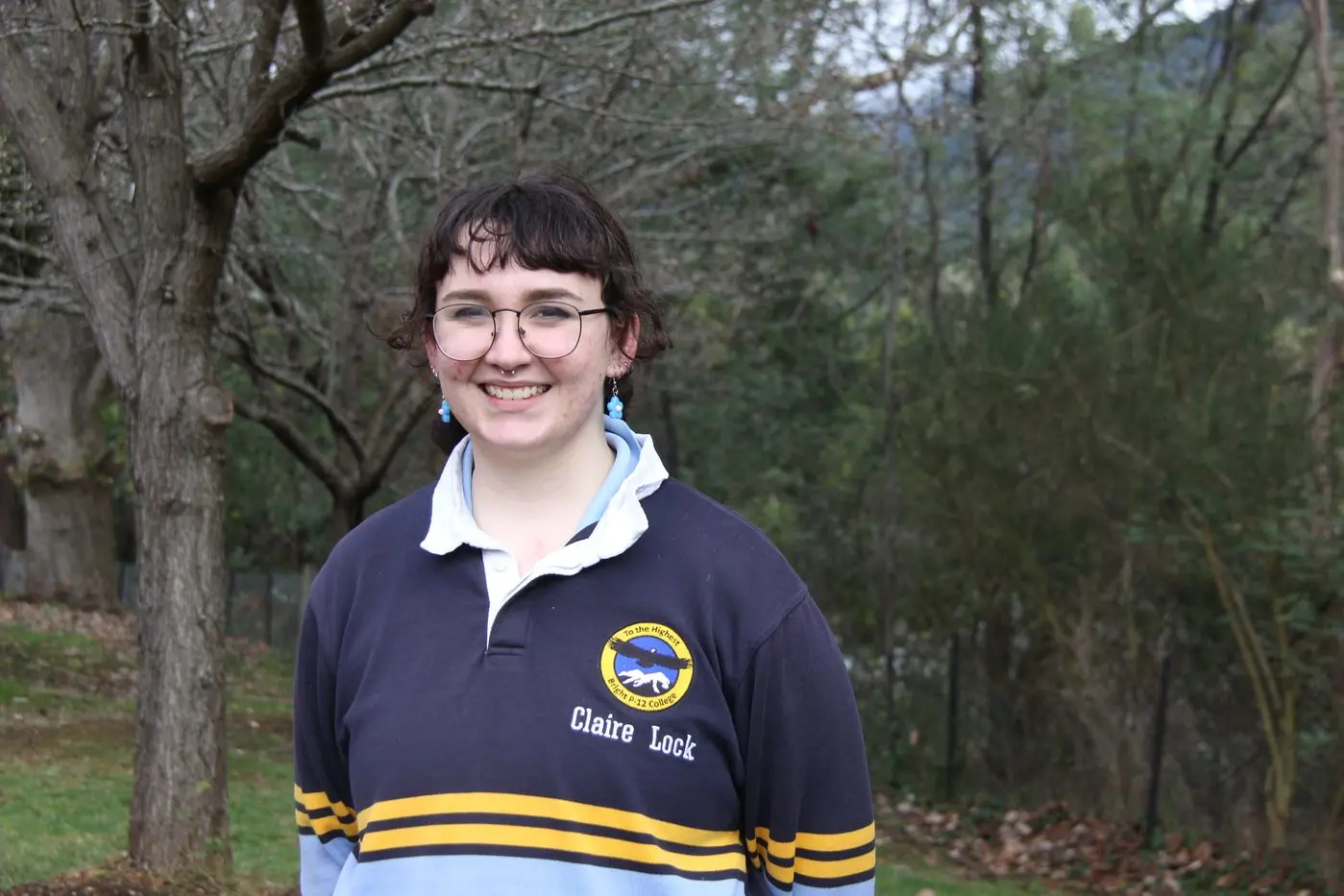PHOTO
A PASSION for helping others and making a change is evident in Bright local, Claire Lock (she/they)*.
The 18 year old senior student at Bright P-12 College is currently an executive advisory member on the Victorian Student Representative Council and a youth advisor for both Women with Disabilities Australia and the Victorian Department of Education and Training in trauma recovery.
She’s also working part time at Bright Brewery.
“For all of these roles, I use my own experience as a young, queer and disabled person to help me,” she said.
“I was diagnosed with dyslexia at age 10 and it affects my reading, writing, comprehension and processing.
“Reading, writing and comprehension are so important in today's society, especially completing VCE; that's basically the whole idea.
“I've had to change the way I do things because most things are accessible and they aren't designed with accessibility in mind.”
Claire said, because of this, she is passionate about everyone getting a fair go, "no matter where they live, who they are, or what they do".
“We live in a very narrow society and a lot of things were designed for a specific type of person," she said.
“I am also super passionate about tackling the inadequacies of our education system.
"After experiencing a school system that simply was not built for me, as a person with a disability, for 13 years, I want to change it so no one else has to experience it.
“That is something that drives a lot of the passion behind it all, I turn to situations that made me feel less than, unheard or unrepresented and I do my best to make sure that no one else has to have that experience.”
Recently, Claire has been recognised for some of their achievements, both locally and around the state.
“Last year I received the massive honour of being the Alpine Shire’s Youth of the Year for my advocacy work in education, mental health and bushfire trauma,” Claire said.
“Earlier this month, an article I wrote about mental health was published in The Age, which was absolutely mind-blowing.
“I was also the first young person to address the Victorian Legislative Council, which occurred in Bright during their regional sitting earlier this year.
“Even small things such as helping organise Bright P-12’s first International Day Against Homophobia, Biphobia and Transphobia (IDAHOBIT) earlier this year I would see as achievements.”
Claire said conversations around these topics are so important in rural communities.
“For a lot of young people like myself, there is a feeling of being found out when living in a small community," they said.
“It feels like there is this stigma around talking about these things, especially mental health.
“I think the bushfires and lockdowns have really highlighted the need to talk about mental health but we still have such a long way to go.
“Disability still feels like this thing that we don't acknowledge unless it’s absolutely necessary; there isn't an understanding around supporting people with disabilities, especially ones that aren't obvious when looking at a person.
“In small towns, being open to having conversations and accepting people of all backgrounds is so important.
“Rural towns get a bad rapt with being sheltered and uninviting, especially those who identify as LGBTQIA+, but we can change that.
“Having conversations openly around these topics would allow the younger generation to feel a lot more accepted in the towns they come from and would set a tone of acceptance and understanding for the whole community.
“I truly believe that having these conversations would bring us closer as a community.”
Claire said her interest in becoming involved with youth councils and advocacy came from a place of “anger and hurt”.
“It was really soon after the bushfires and years of being let down by systems that weren’t made for me,” Claire said.
“I didn’t know where to go to be heard but I found VicSRC and instantly fell in love with advocacy.
“It was something I never really saw myself getting into but I wouldn’t change it for the world.
“Being part of a larger group calling for change is really empowering and the support that is shown by the people around me is incredible.
“I love the people I meet through this work and being a part of my local community; I’ve found like-minded people who also want to change the way things work for the better.
“COVID really allowed me to grow my comfort zone in regards to meeting new people and being comfortable in my own identity and that shows in my work.
“Before finding these groups, I never really felt like I belonged anywhere, but now that I’ve found my niche, I couldn’t be happier.
“The sense of community and ‘we’re all in this together’ has made a time where the world seems pretty scary into an opportunity to change the system.”
Claire said in the long run, they would love to pursue rural medicine.
“Potentially rural psychiatry or general practice,” they said.
“I don’t really know what the future holds, especially in times like this, but I’m hoping to continue working in advocacy for as long as I can, partly because I love it, but also because there is so much to keep fighting for.”
*Claire is non-binary and uses she/they pronouns. This is why we have used both 'she' and 'they' interchangeably throughout the piece as Claire has no preference to either and is happy to be referred to as both she/her and they/them.





